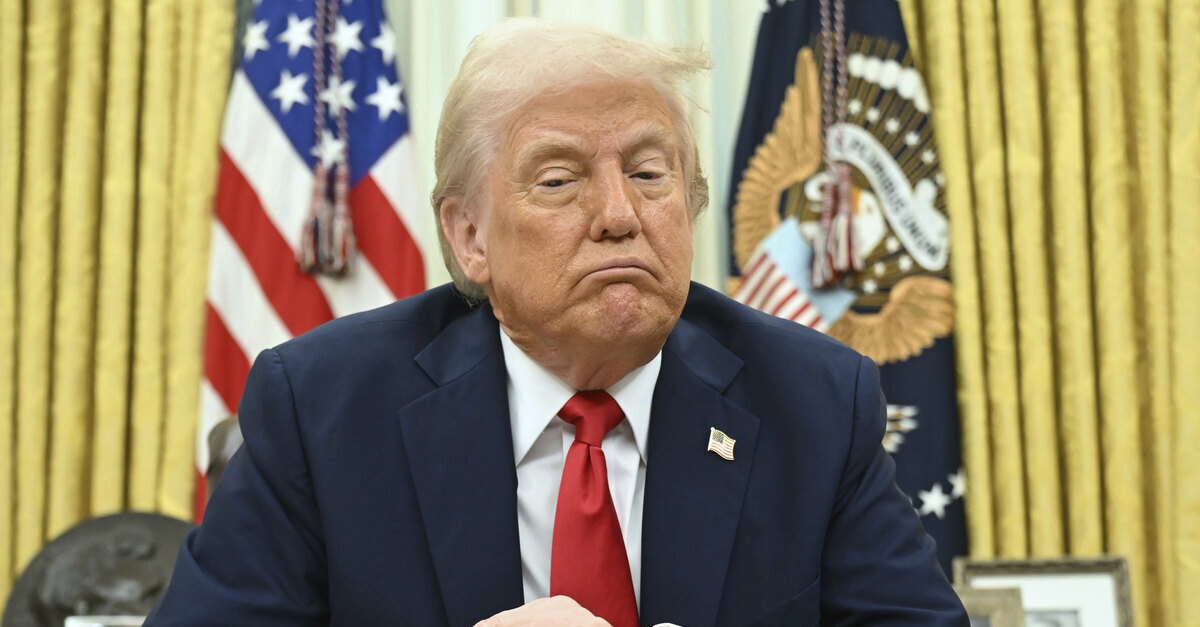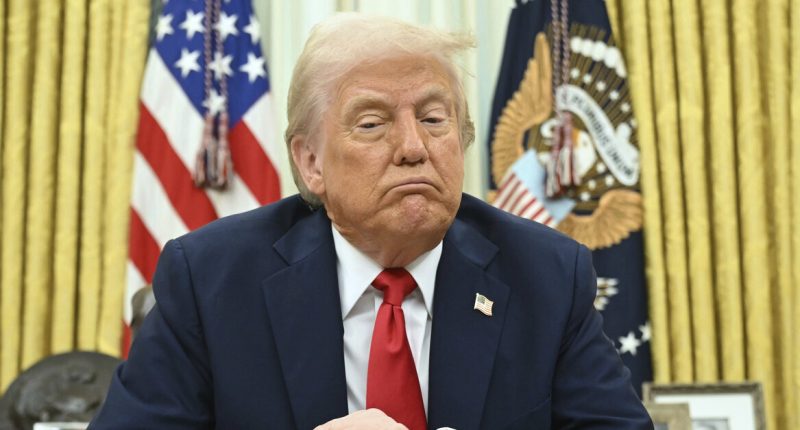
President Donald Trump speaks to reporters before signing an executive order in the Oval Office of the White House in Washington, Monday, March 31, 2025 (Pool via AP).
President Donald Trump‘s recent imposition of worldwide tariffs are an illegal “unprecedented power grab,” and should be enjoined, a coalition of businesses said in a lawsuit filed on Monday.
In a 25-page complaint filed in the U.S. Court of International Trade, the Liberty Justice Center, a libertarian public interest law firm, represents five owner-operated businesses who claim they have been directly and irrevocably harmed by Trump’s market-shifting levies.
In the filing, the plaintiffs say they “will face increase costs for the goods they sell, less demand for their higher priced products, and disrupted supply chains, among other threats to their livelihood, up to and including potentially bankrupting otherwise solvent companies.”
The 45th and 47th president has issued a series of controversial “Liberation Day” tariffs — which have since been somewhat scaled down — largely under the authority of the International Emergency Economic Powers Act (IEEPA).
“The President of the United States claims the authority to unilaterally levy tariffs on goods imported from any and every country in the world, at any rate, calculated via any methodology — or mere caprice — immediately, with no notice, or public comment, or phase-in, or delay in implementation, despite massive economic impacts that are likely to do severe damage to the global economy,” the complaint reads.
The lawsuit claims Trump’s use of the heretofore obscure 1970s-era law used to justify the tariffs is improper — and broadly illegal.
“[T]he President’s justification does not meet the standards set forth in the IEEPA,” the complaint goes on. “His claimed emergency is a figment of his own imagination: trade deficits, which have persisted for decades without causing economic harm, are not an emergency. Nor do these trade deficits constitute an ‘unusual and extraordinary threat.’ The President’s attempt to use IEEPA to impose sweeping tariffs also runs afoul of the major questions doctrine.”
The Trump administration, to various degrees, has repeatedly cited the existence of so-called “trade deficits” to justify the tariffs.
More from Law&Crime: ‘This unlawful impost must fall’: Conservative group sues Trump claiming tariffs are ‘unconstitutional exercise of legislative power’
The lawsuit spends considerable time attempting to disabuse the government of the notion that such deficits are anything to worry about — much less anything approaching any kind of emergency.
“Trade deficits are not unusual or extraordinary — the United States has run a net trade deficit at most times since World War II, and consistently since the 1970s,” the filing explains. “That necessarily includes bilateral trade deficits with many individual nations. Nor are trade deficits an emergency or even necessarily a problem; they simply mean that some other country sells lots of things Americans want to buy, or that its people are unwilling or unable (often because of poverty) to purchase many American goods. Moreover, trade deficits go hand in hand with capital surpluses, which increases investment in the United States.”
More Law&Crime coverage: ‘Unlawful action’: Federal judge shuts down Trump’s attempt to strip deportation protections from half a million immigrants
The plaintiffs note the IEEPA “does not mention tariffs or duties, or at any point suggest that it is granting the power to lay and collect such.”
The lawsuit also says the one law cited by the president in his Liberation Day executive order that does mention tariffs — “section 604 of the Trade Act of 1974” — is being misinterpreted and misused.
“Section 604 is a bookkeeping provision: it assigns to the President the task of periodically updating the Harmonized Tariff Schedule to reflect changes in policy that have occurred,” the lawsuit continues. “It does not set out any power, authority, or process by which the President may unilaterally set such policies.”
The lawsuit also poses a slippery slope argument, at length:
If longstanding, perfectly normal, bilateral trade deficits qualify as an “emergency” and as an “unusual and extraordinary threat,” the same can be said of virtually any international economic transaction that the President disapproves of for virtually any reason. The President would have the power to impose any level of tariffs on goods or services from any country, for any purpose, pretty much anytime he wants.
The sheer breadth of this claimed power — to impose tariffs at any level on any country at any time, at levels that could very well crash the global economy — counsels against reading IEEPA to confer such an extreme delegation of authority.
Such a “broad and consequential power to upend the global economy” as claimed by Trump must be the result of Congress delegating such authority, the lawsuit argues. At present, the plaintiffs say, Trump has stretched the “specific grant of emergency authority” in the IEEPA “into general tariff authority.”
“Presidential authority to unilaterally impose worldwide tariffs, if Congress were to grant it at all, must be granted clearly and unmistakably — not through some implication so vague and indeterminate that it went unnoticed by every other President for nearly five decades,” the lawsuit argues, disdainfully.
Love true crime? Sign up for our newsletter, The Law&Crime Docket, to get the latest real-life crime stories delivered right to your inbox.
Each of the businesses, in turn, lay out their own versions of economic doomsday scenarios caused by the new tariff regime.
The lead plaintiff, V.O.S., an alcohol importer, claims general tumult with pricing, shipping, product selection, inventory levels, reduction in cash flow, and reduction in purchase orders.
Another plaintiff, Genova Pipe, says they can no longer source raw materials because of the tariffs — resulting in increased costs and potentially large losses of revenue.
The other companies say they will soon be unable to pay their employees, have been forced to pause production, and can no longer afford to import finished goods. One company, in plain language decries the tariffs as “an existential threat.”
“As these impacts on the Plaintiffs show, the tariffs imposed by the Liberation Day Order are unprecedented, and simply breathtaking in scale,” the lawsuit reads.
The business are asking the judge, who has national jurisdiction over trade disputes, to declare that the IEEPA contains no authority to impose tariffs and that Trump is in violation of the statute, and to enjoin the April tariff-related executive orders.







